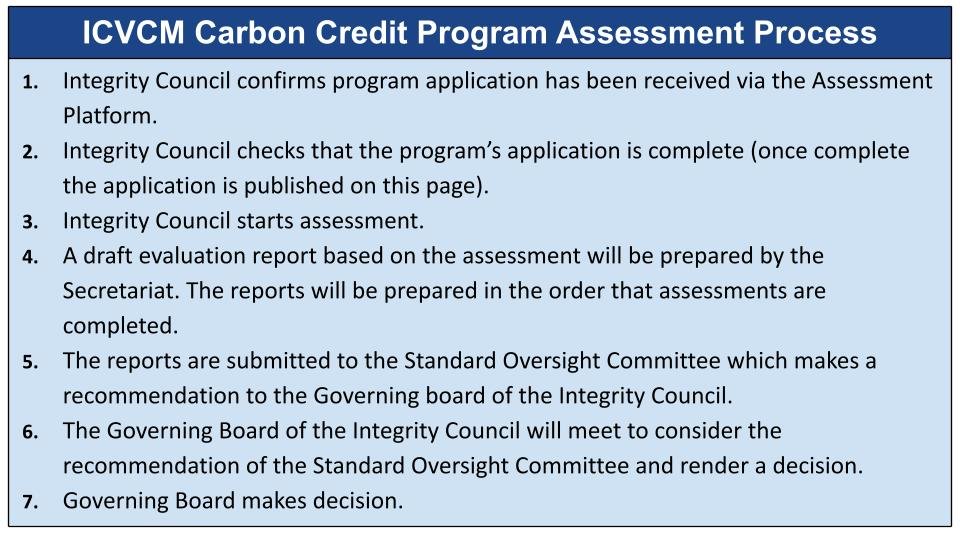The Integrity Council for the Voluntary Carbon Market (ICVCM) has announced its approval of the first carbon-crediting methodologies meeting its stringent Core Carbon Principles (CCPs).
In the latest round of assessments, seven methodologies were approved, enabling the high-integrity CCP label to be applied to about 27 million carbon credits. These credits are associated with projects that mitigate potent greenhouse gases, such as methane from landfill sites.
Currently, an additional 27 categories of carbon credits, which represent over 50% of the market, are under active assessment. This includes methodologies related to landfill gas and ODS, covering an estimated 76 million and 4 million credits, respectively. Ozone-depleting substances (ODS) are from discarded equipment like refrigerators and air conditioners.
Ongoing assessments also include popular carbon credit types, including:
- REDD+ (Reducing Emissions from Deforestation and Forest Degradation),
- Jurisdictional REDD (JREDD), and
- Clean cookstoves, with results expected in the coming months.
ICVCM’s Continuous Progress in Carbon Credit Integrity
The ICVCM’s announcement of assessment decisions is a continuous process, influenced by factors such as information availability, start times, and expert availability. This staggered approach does not reflect the relative integrity of different methodologies.

Annette Nazareth, Chair of the ICVCM, emphasized the importance of the CCP label in helping buyers identify high-integrity carbon credits. She highlighted that the approved credits come from projects capturing potent GHG, which are crucial for immediate climate mitigation. She also particularly noted that:
“This is just the beginning. We will be announcing further categories eligible for CCP-labels that meet our criteria as we continue our careful and thorough evaluation of the submitted crediting methodologies and properly consider complex issues with our expert stakeholders…”
Governments increasingly recognize the role of a high-integrity VCM in scaling up private sector finance for quality emission reduction and carbon removal projects.
The U.S. Government recently published principles for high-integrity carbon credits, aligning closely with the CCPs. Learn more about the major points of the Biden administration’s VCM policy guidelines here.
Strengthening Trust in the VCM With “Two-Tick” Process
Under the ICVCM’s “two-tick” process, carbon credits receive the CCP label only if both the carbon-crediting program and the methodologies used are CCP-Approved. Programs like ACR, Climate Action Reserve (CAR), Gold Standard, and Verra (VCS) are CCP-Eligible, allowing them to apply the CCP label to credits from approved methodologies.
The CCP-approved status of credits will be displayed in program registries, and marketplaces are expected to bundle CCP-labelled credits for sale within the year. The CCPs set a global benchmark for high-integrity carbon credits, ensuring trust in the voluntary carbon market. They also help the market maximize its potential in combating carbon emissions.
- RELEVANT: The Core Carbon Principles
The CCP label guarantees that credits represent genuine emissions reductions or removals, with robust social and environmental safeguards and positive sustainable development impacts.
The ICVCM’s work is complemented by VCMI’s efforts to ensure integrity in carbon credit use. VCMI’s Claims Code of Practice provides guidance for credible net zero claims supported by CCP-Approved carbon credits.
In a joint statement on the U.S. Government’s principles, climate leaders Michael Bloomberg, Mark Carney, and Mary Schapiro urged governments to adopt common integrity standards, leveraging the ICVCM’s supply-side standards and labeling.
The Approved Carbon Credit Methodologies
The ICVCM has approved versions of three methodologies for ODS projects. This covers an estimated 12 million carbon credits, and four methodologies for landfill gas (LFG) projects, covering around 15 million credits. These methodologies include:
- ACR’s Destruction of ODS from International Sources version 1.0
- CAR’s Article 5 Ozone Depleting Substances Project Protocol versions 1-2
- CAR’s U.S. Ozone Depleting Substances Project Protocol versions 1-2
- ACM0001 – Flaring or use of Landfill Gas versions 15-19 (used by Verra and Gold Standard)
- AMS iii G – Landfill Methane Recovery version 10 (used by Verra and Gold Standard)
- ACR’s Landfill Gas Destruction and Beneficial Use Projects version 1-2
- CAR’s US Landfill Protocol version 6
Amy Merrill, ICVCM’s Interim COO, stated that many methodologies under assessment might not meet the CCP criteria and could be rejected. The ICVCM’s assessment process allows programs to submit additional information or request hearings if methodologies are at risk of rejection.
Pedro Martins Barata, ICVCM Expert Panel, noted that the initial assessments raised complex issues requiring detailed expert discussions. The ICVCM aims for continuous improvement, helping programs evolve methodologies based on assessment observations.
Carbon credits using CCP-Approved methodologies must ensure genuine emissions impact, permanence, rigorous measurement, and independent verification. Reductions and removals must be additional, support the net zero transition, and avoid locking in fossil fuel emissions.
-
The ICVCM has approved five programs with a 98% market share as CCP-Eligible: ACR, ART, CAR, Gold Standard, and VCS by Verra.
Other programs like Isometric, Puro.earth, and Social Carbon are still being assessed. The ICVCM’s assessments will continue through the year, with decisions announced monthly.
The ICVCM’s approach is modeled on financial regulators, ensuring programs adhere to rules and correctly tag credits with CCP labels. The ICVCM will audit programs, perform spot checks, and address complaints, with the authority to terminate eligibility if necessary. Continuous improvement work programs will enhance the Assessment Framework, adapting to new scientific and market developments.

